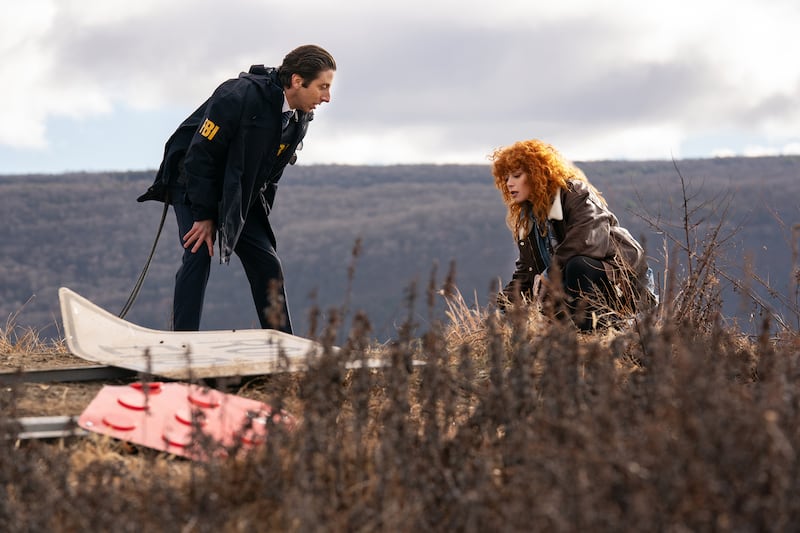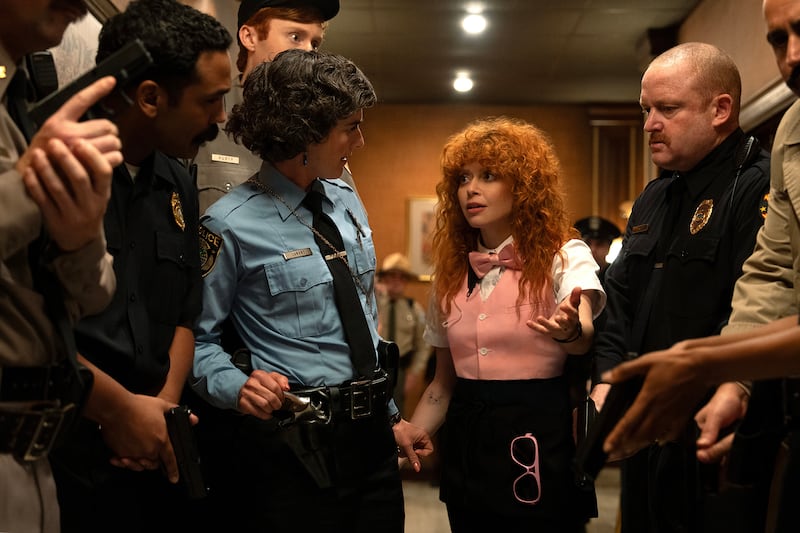Poker Face is a murder-of-the-week procedural in an overtly Colombo vein. Yet Rian Johnson and Natasha Lyonne‘s modern-day all-star throwback loves movies almost as much as it adores TV, peppering its action with so many references and homages to classic films that it’s surprising each entry isn’t preceded by the Criterion Collection logo.
An auteurist spirit guides this intensely entertaining Peacock affair, and in its second season, premiering May 8, it hits even more highs than during its maiden run, providing an assortment of homicidal stories that are as idiosyncratic as its heroine, a “human lie detector” whose ability to tell when people aren’t being honest is its sleuthing hook. Old-school television is rarely as fresh and funny—and cinematic—as this episodic thriller.
Poker Face isn’t a whodunit but a “howcatchem,” with installments beginning with prologues that reveal the identity, and methods, of their killer before flashing back to detail how Charlie Cale (Lyonne)—a drifter with a gift for deducing who’s being truthful, and who instinctively calls “bullshit” when someone isn’t—unravels the conspiracy.
Cruising the country in her 1969 Plymouth Barracuda, and with “a voice like a rusty trombone,” she’s a nomadic millennial Hercule Poirot, and if her acuity is a fantastical superpower that occasionally feels like a too-easy cheat, allowing her to solve crimes simply by hearing a culprit tell a fib, it’s nonetheless creatively employed throughout each of its twelve chapters.
Once again, those are populated by stars big and small, with the show balancing its A-listers with a bevy of excellent supporting players—Kevin Corrigan, Brendan Sexton III, and I Think You Should Leave‘s Patti Harrison—who’ve long energized off-beat and independent projects.

Lyonne is the sun around which everything in Poker Face revolves, and she’s brighter than ever in its sophomore run, sarcastically rambling from one state—and community, and culture—to another with wry take-it-as-it-comes nonchalance and good humor.
Charlie is a role so perfectly built for the actress’ witty ragamuffin cool that it never seems like she’s giving a performance (a not-inconsiderable feat). She’s in fine form as she hits the road in the premiere, attempting to scrape by via whatever odd job she can land while simultaneously evading the goons sent by mob boss Beatrix Hasp (Rhea Perlman) to finish her off.
Beatrix’s pursuit of Charlie is the sole serialized thread tethering the early action, and it’s a somewhat distracting one, lending the material a chronology it doesn’t need. Fortunately, it’s dropped after its third tale—which, incidentally, is the season’s sole stumble, largely because, despite the participation of John Mulaney and Richard Kind, it abandons its tried-and-true template of presenting a murder and then rewinding to depict amateur gumshoe Charlie cracking the case.
Poker Face commences with a gem about quadruplets who made a mint as child actors on a goofy TV cop show, only to be screwed out of their fortune by a stage mother (Jasmine Guy) who, on her deathbed, intends to leave her millions to a heretofore-unknown fifth identical child. Led by a terrific Cynthia Erivo as all five siblings, it’s an amusing delight that allows the Wicked headliner to go bold and just the right amount of cartoonish.

It sets a suitably ambitious tone that’s maintained throughout the ensuing chapters, in which Charlie finds herself knee deep in fatal trouble at a funeral home run by a director (Giancarlo Esposito) with an unhappy wife (Katie Holmes), a minor league baseball stadium whose former prospect (Simon Rex) is desperate to reclaim his 100 mph fastball, and a New York City bar that’s home to a crew of con men led by a grifter (John Cho) who has his eyes on a choice mark (Melanie Lynskey).
In each of its mini-dramas, Poker Face grants its guest stars plentiful chances to shine, all as it keeps its focus on Charlie and her preternatural skill at detecting falsehoods and coming up with the perfect one-liner to cut a person (or situation) down to size.
Its episodes are wildly distinctive, confidently imagining a wide range of American milieus and their wacko inhabitants. Of those new narratives, the best takes place in the most unlikely of locales: a suburban preparatory school where Charlie, working as the Sloppy Joe-ladling lunch lady, is pitted against a conniving elementary school striver whose hunger for classroom gold stars leads her to sabotage the talent-show performance of her rival—a saga that hilariously involves death, blackmail, and quite a few psychotically intimidating adolescent threats.
Everyone in Poker Face does top-shelf work, be it Sam Richardson as a big box retailer employee who, upon being fired by his boss (Corey Hawkins), decides to use his heist-movie script as a blueprint for a real crime, or Kumail Nanjiani as a Tiger King-esque Florida panhandle cop known as Gator Joe who—much to the chagrin of Gaby Hoffmann‘s up-and-up police officer—keeps winning law enforcement awards thanks to his partnership with a pet croc named Daisy and the catchphrases (“Gator done!”) that have made him an energy drink-promoting social media sensation.
The series doesn’t boast a bad turn from its illustrious cast, and its mysteries are consistently inventive. They’re also embellished with copious shout-outs to celluloid favorites, whether via rat-a-tat-tat quips (such as Charlie quoting Linda Manz from Dennis Hopper’s Out of the Blue) or a confidence-game plot that playfully echoes David Mamet’s House of Games.

Poker Face comes out of the gate like a Triple Crown winner and then maintains its stride throughout, giving Charlie a new CB radio pal (Steve Buscemi) with whom she can chat about her escapades, and finding unconventional ways to employ its familiar faces, such as Clifford “Method Man” Smith as a Brooklyn gym owner who’s keeping his business afloat by selling “the good stuff” to his swole clientele.
No matter where it’s setting up shop, the series is sharp and assured, spinning tangled yarns in which homicide is the inevitable byproduct of jealousy, greed, resentment, and fury, and to an even greater extent than before, it freely moves between venues without losing a hint of its unique personality. With Lyonne at the helm, it’s a rollicking road trip which proves that there’s still plenty of life left in time-honored big- and small-screen formulas.
The post ‘Poker Face’: Natasha Lyonne Doing ‘Colombo’ Is More Entertaining Than Ever appeared first on The Daily Beast.




